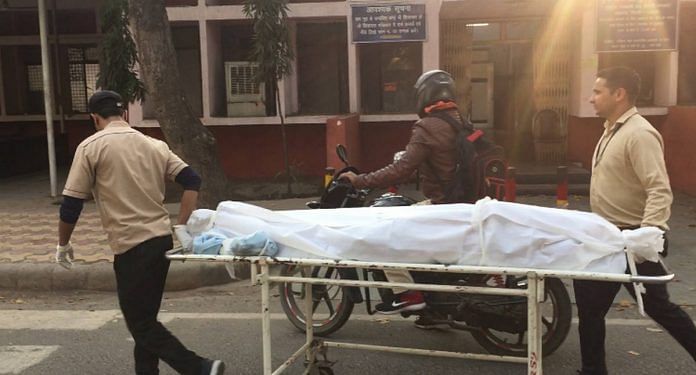New Delhi: Public health system in the national capital ended up inflicting secondary trauma and added to difficulties for victims seeking care during last week’s communal riots, public health advocacy group Jan Swasthya Abhiyan (JSA) alleged in its ground report Monday.
The JSA released its report along with testimonies from three other civil society groups documenting the public health system’s response during the communal violence in Northeast Delhi.
At least 46 people were killed in the Delhi riots that left hundreds injured.
Speaking at a press meet, JSA activist Inayat Kakar claimed government hospitals weren’t cooperative and withheld information, asking families to go from ward to ward, and room to room to check for their family members.
“Even now, patients have not gone to the hospitals to seek treatment, preferring the local clinics,” Kakar said.
One of the common reasons to deny treatment was lack of Medico-legal Case (MLC) number and treatment record being provided to injured persons which wasn’t provided by the hospitals. In other cases patients were turned away with minor treatment without diagnosing the full range of the injuries, she alleged.
Injured persons also reported facing discriminatory remarks, including being referred to as “ugrawadi” (extremists) and “aatankwadi” (terrorists) by medical staff, Kakar alleged at the meet.
According to the report, mobs also prevented ambulances from reaching hospitals in several instances. Eventually private and charitable health institutions became the port of first call for injured persons.
It added that injured persons who did reach government hospitals like Guru Teg Bahadur (GTB) Hospital and Lok Nayak Jai Prakash Narayan Hospital reported feeling intimidated by the police presence there.
The Delhi Police has faced allegations of inaction during the communal riots.
Also read: We can’t stop such incidents from taking place — CJI Bobde on Delhi communal riots
‘Remove bandages, Delhi Police asked’
Dr Harjit Singh Bhatti, national president, Progressive Medicos & Scientists Forum (PMSF), a doctor’s collective which was among the three organisations present at the meet, alleged that the role of Delhi Police in stopping ambulances was “problematic”.
Bhatti narrated an incident of a patient at the Al Hind Hospital in Mustafabad who had a gunshot wound. While the patient had had a bullet deep in the stomach, he wasn’t ready to be moved to the GTB Hospital due to lack of trust. After being coaxed, he agreed. However, his ambulance was stopped four times on the way within a distance of 1 km.
“The police insisted that we show them the wound, removing the bandages,” Bhatti said. “We couldn’t convince them of the seriousness… At one point, they asked the attendant to get down from the ambulance leaving the patient all alone at the hospital.”
Also read: Conspiracies, threats and deleted posts — BJP leader BL Santhosh’s angry Twitter world
No access to medical care
According to the JSA report, health facilities in areas that saw the most violence in Northeast Delhi are scarce — mohalla clinics do not exist and some primary healthcare centres have been lying shut since the violence began.
Small private hospitals, like Al Shifa, that ended up providing healthcare were not equipped to deal with the situation, while large hospitals like GTB had to discharge patients due to overcrowding.
The report said that there were also intentional lapses. In many cases, details of case history were not recorded — such as where the violence took place, with what weapon, who the assailant was, etc., it said.
At the community level, the violence has led to large-scale displacement of families, and access to routine treatment for chronic illnesses has been disrupted.
“Both state and Centre’s response to the Delhi violence has been very poor, no efforts were or are made to set up health facilities to reach people,” said Bhatti.
In its report, the JSA demanded setting up liaison desks in government hospitals to help injured seek care, issuing MLC records or post-mortem reports to families, written orders to charitable hospitals informing them of provisions to provide free care to riot victims, among others.
Also read: Under political pressure or a scapegoat? Where Delhi Police chief Amulya Patnaik went wrong



